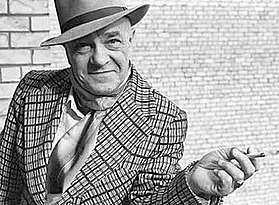Valentin Pikul
Valentin Savvich Pikul (Russian: Валенти́н Са́ввич Пи́куль) (July 13, 1928 – July 16, 1990) was a popular and prolific Soviet historical novelist of Ukrainian-Russian heritage. He lived and worked in Riga.
Valentin Pikul | |
|---|---|
 | |
| Born | July 13, 1928 Leningrad, Soviet Union |
| Died | July 16, 1990 (aged 62) Riga, Latvia |
| Language | Russian |
| Genre | popular history, fiction |
| Notable works | At the Last Frontier, Requiem for Convoy PQ-17 |
Pikul's novels were grounded in extensive research, blending historical and fictional characters and often focusing on Russian nationalistic themes.[1] Pikul's best-selling 1978 novel At the Last Frontier was a dramatized telling of Rasputin's influence over the Russian imperial court. Richard Stites says he was "a name hardly known to literary scholars but the most widely read author in the Soviet Union from the seventies to today [i.e., 1991]...[2] Pikul's works were wildly popular: more than 20 million copies were sold in his lifetime .
Little of Pikul's work has been translated into English. In May 2001 a seagoing minesweeper of the Black Sea Fleet was named in his honor.
Works
- Ocean patrol, (Океанский патруль), 1954
- Bajazet, (Баязет), 1961
- Tares, (Плевелы), 1962
- Paris for three hours, (Париж на три часа), 1962
- On the outskirts of a great empire, (На задворках великой империи), 1964–66
- Out of the deadlock, (Из тупика), 1968
- The Requiem for Convoy PQ-17, (Реквием каравану PQ-17), 1970
- Moonzund, (Моонзунд), 1970 (screen version - Moonzund, 1987)
- By plume and sword, (Пером и шпагой), 1972
- Stars over the marsh, (Звёзды над болотом), 1972
- Boys with bows, (Мальчики с бантиками), 1974
- Slovo and Delo, (Слово и дело), 1974–75
- The Battle of Iron Chancellors,(Битва железных канцлеров), 1977
- Riches, (Богатство), 1977
- The Demonic Forces, (Нечистая сила), 1979
- The Three Ages of Okini-San, (Три возраста Окини-сан), 1981
- To each his own, (Каждому своё), 1983
- The Favorite, (Фаворит), 1984
- Cruisers, (Крейсера), 1985
- I have the honour, (Честь имею), 1986
- Hard Labor, (Каторга), 1986
- Go and sin no more, (Ступай и не греши), 1990
- Operation Barbarossa, (Барбаросса. Площадь павших борцов), 1990
- Arakcheevshina, (Аракчеевщина)
- Psy Gospodni, (Псы господни)
- Janissary, (Янычары)
- Fat, dirty and corrupt, (Жирная, грязная и продажная)
Footnotes
- Natalya Ivanova, "A New Mosaic out of Old Fragments: Soviet History Re-Codified in Modern Russian Prose" (Conference Papers, Stanford University, October 1998), pp. 25-26.
- Richard Stites, Russian Popular Culture (Cambridge UP, 1992, repr. 1995), p. 151.